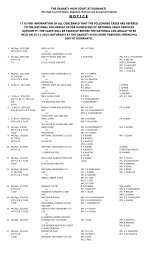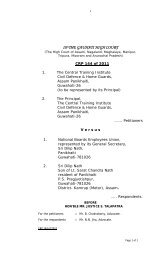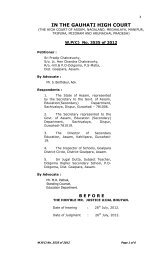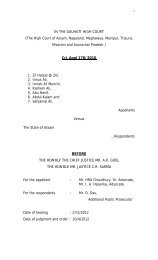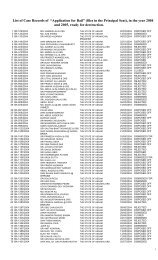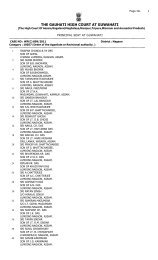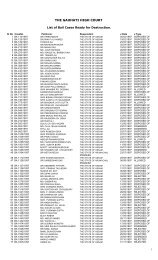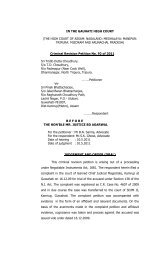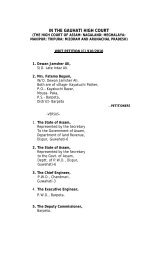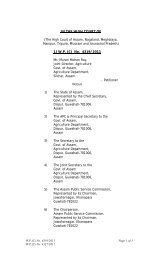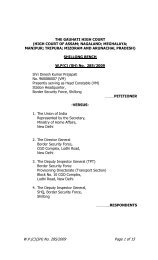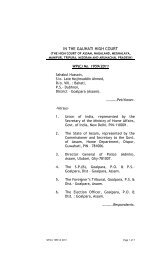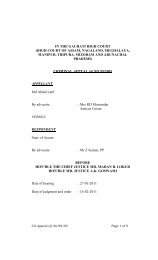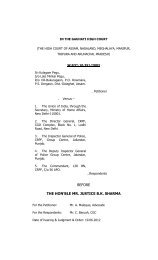IN THE GAUHATI HIGH COURT W.P(C) No.140 (SH) of 2010 1. Shri ...
IN THE GAUHATI HIGH COURT W.P(C) No.140 (SH) of 2010 1. Shri ...
IN THE GAUHATI HIGH COURT W.P(C) No.140 (SH) of 2010 1. Shri ...
- No tags were found...
Create successful ePaper yourself
Turn your PDF publications into a flip-book with our unique Google optimized e-Paper software.
44. IsraqueS/O Md Uzahat Husen45. <strong>Shri</strong> Sukhdeo RayS/O Late Sar Jug Ray46. <strong>Shri</strong> Dinesh Prasad SinghS/O Late Sitaram Ray47. <strong>Shri</strong> Ram Babu RayS/O Rambilash Ray48. <strong>Shri</strong> Lal SinghS/O Late Perbey Thapa49. <strong>Shri</strong> Kumar GurungS/O Late Madhorraja Gurung50. Ram B ThapaS/O Phul Prasad Thapa5<strong>1.</strong> <strong>Shri</strong> JumratiS/O Md.Habi52. JamaluddinS/O Md.Sahabudin53. <strong>Shri</strong> Mangal MurmuS/O Late Shom Murmu54. <strong>Shri</strong> Haribansh RayS/O Bake Ray55. <strong>Shri</strong> Om Prakash BalmikiS/O Late Munchi Balmiki56. <strong>Shri</strong> Bharat Prasad YadavS/O Late B.Yadav57. <strong>Shri</strong> Lil B.GurungS/O Peny B.Gurung58. Abdullah KhandakarS/O Late AkhiluddinW.P(C) <strong>No.140</strong> (<strong>SH</strong>) <strong>of</strong> <strong>2010</strong> Page 4 <strong>of</strong> 19
59. <strong>Shri</strong> Shyam Babu RayS/O Ram Bilash Ray60. <strong>Shri</strong> Shiv HasdaS/O Late Bashit Hasda6<strong>1.</strong> <strong>Shri</strong> Pancham BaithaS/O Ram Sunder Baitha62. <strong>Shri</strong> Ashik RayS/O Harekhan Ray63. <strong>Shri</strong> Yam Prasad AriyalS/O Dilli Ram Aryal64. <strong>Shri</strong> Parimal PaulS/O Late D.C.Paul65. <strong>Shri</strong> Ramesh GurungS/O Dirgaman Gurung66. <strong>Shri</strong> Ranjan BorahS/O Late Mema Kant Borah67. <strong>Shri</strong> Motiul Islam BorbhuiyanS/O late Md.Arzumia68. <strong>Shri</strong> Satur MurmuS/O Mangal Murmu69. <strong>Shri</strong> Prakash PrasadS/O Late Dib Run70. <strong>Shri</strong> Dominik HasdaS/O Charan Hasda7<strong>1.</strong> <strong>Shri</strong> Baban BaskiS/O Late Thakur Baskey72. <strong>Shri</strong> Soban HembremS/O Late Lakhi Ram Hembrem73. <strong>Shri</strong> Suresh BoroS/O Late Mahendra BoroW.P(C) <strong>No.140</strong> (<strong>SH</strong>) <strong>of</strong> <strong>2010</strong> Page 5 <strong>of</strong> 19
74. <strong>Shri</strong> Bhurelal BalmikiS/O Late Muthu Balmiki75. <strong>Shri</strong> Sudhir RoyS/O Late Naba Ram Roy76. <strong>Shri</strong> Birendra BalmikiS/O Nolurcuan Balmiki77. <strong>Shri</strong> Gopali BalmikiS/O Late Yadram Balmiki78. <strong>Shri</strong> Subash PrasadS/O Late Dilip Prasad Tamta79. <strong>Shri</strong> Shatrudhan SinghS/O Umesh Prasad Singh80. <strong>Shri</strong> K.R.DavidS/O K.R. Malungzing8<strong>1.</strong> <strong>Shri</strong> Sher B.ThapaS/O Late Tara B.Thapa82. <strong>Shri</strong> Mon B ThapaS/O Late Kharka B.Thapa83. <strong>Shri</strong> Mahendra BaithaS/O Rajendra Baitha84. <strong>Shri</strong> Biplab SilS/O Late Dhirendra Sil85. <strong>Shri</strong> Baldev SinghS/O Amar Singh86. <strong>Shri</strong> Hemant K.SinghS/O Upendra Prasad Singh87. <strong>Shri</strong> Bhim P.SubediS/O Manikantha Subedi88. <strong>Shri</strong> Sonowar HusenS/O Md.Sanichi Mula HusenW.P(C) <strong>No.140</strong> (<strong>SH</strong>) <strong>of</strong> <strong>2010</strong> Page 6 <strong>of</strong> 19
89. <strong>Shri</strong> Manindra SharmaS/O Nabakushar Sharma…………..PETITIONERSThe petitioner Nos.1 to 22 are teaching employees andNos.23 to 89 are non-teaching employees <strong>of</strong> the AssamRifles Public School, Laitkor, Shillong-10, Meghalaya.-VERSUS-<strong>1.</strong> Union <strong>of</strong> India,represented by the Secretary,Government <strong>of</strong> India,Ministry <strong>of</strong> Home Affairs, New Delhi.2. The Chairman,Governing Body Assam Rifles Public School,Laitkor, Shillong-10,Meghalaya.3. The Director General, Assam Rifles,Laitkor, Shillong, Meghalaya.4. Assam Rifles Public School,Through the Principal & Secretary<strong>of</strong> the School, Laitkor, Shillong-10,Meghalaya.B E F O R EHON’BLE MRS JUSTICE ANIMA HAZARIKA…………RESPONDENTSAdvocates for the petitioners : Dr. JL SarkarMr. SN Tamuli.Advocates for the respondents : Mr. SC Shyam,Central Govt. CounselDate <strong>of</strong> hearing : 06.06.2011Date <strong>of</strong> delivering judgment : 12.8.201<strong>1.</strong>W.P(C) <strong>No.140</strong> (<strong>SH</strong>) <strong>of</strong> <strong>2010</strong> Page 7 <strong>of</strong> 19
JUDGMENT AND ORDER<strong>1.</strong> Heard Dr. JL Sarkar, learned counsel assisted by Mr. SN Tamuli,learned counsel appearing for the petitioners. Also heard Mr. SCShyam, learned Central Government Counsel („CGC‟ for short)appearing on behalf <strong>of</strong> the respondents.2. The petitioners, 89 in number, are employees (teaching and nonteaching)<strong>of</strong> Assam Rifles Public School („ARPS‟ for short), Laitkar,Shillong. They have moved this Court by filing the instant writ petitionwith a prayer for issuing writ in the nature <strong>of</strong> mandamus and/orcertiorari or any other appropriate writ or order or direction to therespondents to implement the recommendations made by the 6 thCentral Pay Commission („CPC‟ for short) in respect <strong>of</strong>Pay andAllowances w.e.f. 0<strong>1.</strong>0<strong>1.</strong>2006 in ARPS and to pay the emoluments tothe petitioners, accordingly, along with increased Dearness Allowancefrom July, 2009 in terms <strong>of</strong> the recommendations <strong>of</strong> 6 th CPC, payment<strong>of</strong> which have been withheld after June 2009 with arrears <strong>of</strong> pay andallowances w.e.f. 0<strong>1.</strong>0<strong>1.</strong>2006 and fixation <strong>of</strong> pay w.e.f. 0<strong>1.</strong>04.2008with arrears and grant other service benefits including retirementbenefit at par with civilian employees <strong>of</strong> Government <strong>of</strong> India andemployees <strong>of</strong> Kendriya Vidyalaya Sangathan („KVS‟ for short) as well asJawahar Navodaya Vidyalaya („JNV‟ for short).3. The petitioners pleaded case is that ARPS was established in theyear 1980 and is affiliated to the Central Board <strong>of</strong> Secondary EducationW.P(C) <strong>No.140</strong> (<strong>SH</strong>) <strong>of</strong> <strong>2010</strong> Page 8 <strong>of</strong> 19
(„CBSE‟ for short). Assam Rifles has pervasive financial andadministrative control over ARPS as the main source <strong>of</strong> funding theinstitution, land, building, salaries <strong>of</strong> employees is made from AssamRifles through grants, subsidy, etc. It has been stated by thepetitioners that ARPS is governed by “Assam Rifles Public School Rules”and due to pervasive financial and administrative control <strong>of</strong> AssamRifles, the institution, i.e. ARPS is an authority within the meaning <strong>of</strong>Article 12 <strong>of</strong> the Constitution <strong>of</strong> India, catering to the needs <strong>of</strong> publicinterest <strong>of</strong> education.4. Dr. Sarkar, learned counsel appearing for the petitioners hassubmitted that pay scales <strong>of</strong> teaching and non-teaching staffs <strong>of</strong> theARPS has been at par with the scales <strong>of</strong> pay <strong>of</strong> the similarly situatedemployees <strong>of</strong> the Central Government Schools as per recommendation<strong>of</strong> the CPC and accordingly, by <strong>of</strong>fice order dated 15.7.1998 the payscale at par with Central Govt. Scale (5th PC) has been given effect toand they are getting the same pay scale at par with other CentralGovt. Employees, KVS as well as JNV. The governing body, managingcommittee <strong>of</strong> ARPS have always been just and fair and have treatedthe employees <strong>of</strong> the ARPS at par with other Central Govt. Employeesand pay and allowances are being paid as per CPC recommendation.The same will also be evident from the open advertisement whilerecruiting the employees in the year 2007, when advertisement wasmade for the Post Graduate Teacher („PGT‟ for short) and HostelSuperintendent with closing date <strong>of</strong> application as 15th May, 2007W.P(C) <strong>No.140</strong> (<strong>SH</strong>) <strong>of</strong> <strong>2010</strong> Page 9 <strong>of</strong> 19
wherein scale <strong>of</strong> pay was shown as per 5th CPC, the 6th CPC scalewere at that time not implemented. The 6th CPC scale has been giveneffect to by the Government <strong>of</strong> India later w.e.f. <strong>1.</strong><strong>1.</strong>2006retrospectively with arrears. The post <strong>of</strong> Principal <strong>of</strong> ARPS is also filledup by open advertisement in 2001 allowing the 5th CPC scale. Thelearned counsel has further submitted that the Central Govt. Civilianemployees <strong>of</strong> the KVS and JNV have been receiving pay scale andallowances as per 6th CPC w.e.f. <strong>1.</strong><strong>1.</strong>2006. But, the pay scale under6th CPC has been granted to the petitioners w.e.f. <strong>1.</strong>4.2008 whereasthe Central Govt. has already accepted the recommendation <strong>of</strong> 6thCPC for implementation and has implemented the same for allconcerned. Therefore, there is no reason as to why the petitioners arebeing denied the same. The dearness allowances (DA) has been paid tothe petitioners at par with Central Govt. Civilians up to June, 2009 butthereafter, the same has been kept in abeyance and the petitionersare being given less DA due to non-implementation <strong>of</strong> the same as perCentral Govt. announcement from time to time. Thus, the petitionershave submitted a representation before the authority requestingtherein to allow the pay and allowances and other service benefits asper recommendation <strong>of</strong> 6th pay commission on the ground thatsimilarly situated employees under Govt. <strong>of</strong> India and KVS as well asJNV are getting the pay and allowance as recommended by the 6th paycommission. However, no order being passed and/or no action beingtaken on the representation so submitted, the petitioners haveapproached this Court with the aforesaid prayer. It has further beenW.P(C) <strong>No.140</strong> (<strong>SH</strong>) <strong>of</strong> <strong>2010</strong> Page 10 <strong>of</strong> 19
submitted that the petitioners are entitled for the same under rulesand bye-laws.5. Dr. Sarkar, learned counsel for the petitioners while supportingthe claim <strong>of</strong> the petitioners has also taken me through variousdocuments annexed to the writ petition as well as to the affidavit-inreplyfiled by the petitioners. Drawing my attention to the Minutes <strong>of</strong>the Managing Committee Meeting held on June 18, 1991 videAnnexure-B to the writ petition, it has been strenuously urged by thelearned counsel for the petitioners that the employees have beenextended all the service benefits in terms <strong>of</strong> the recommendationsmade by the CPC from time to time. Further, drawing my attention tothe certificatevide Annexures-D and E respectively to the writpetition, it has been urged that the petitioners, for all practicalpurposes, are employee <strong>of</strong> Assam Rifles and therefore, they areentitled to all the benefits in respect <strong>of</strong> their pay and allowances asper recommendations made by the 6 th CPC.6. A common affidavit-in-opposition has been filed by therespondents through the Principal, ARPS, contending therein that thewrit petition is not maintainable in law, in view <strong>of</strong> the fact that ARPSis a private institution, registered under the Societies Registration Act,1860, established with aim and objectives, inter alia, to promoteeducation amongst the children <strong>of</strong> Assam Rifles <strong>of</strong>ficers, employeesand public. According to the respondents the management <strong>of</strong> theW.P(C) <strong>No.140</strong> (<strong>SH</strong>) <strong>of</strong> <strong>2010</strong> Page 11 <strong>of</strong> 19
school is fully under the control <strong>of</strong> the Managing Committee which isconstituted in accordance with the provisions <strong>of</strong> the Article <strong>of</strong>Association <strong>of</strong> the society. It has further been contended that neitherthe Ministry <strong>of</strong> Home Affairs <strong>of</strong> the Union <strong>of</strong> India nor the DirectorGeneral <strong>of</strong> Assam Rifles have any administrative or financial controlover the management <strong>of</strong> the school, more so, the financialrequirement <strong>of</strong> the school is met from the tuition fee and other feescollected from the students and therefore, the respondent school isnot amenable to the writ jurisdiction <strong>of</strong> this Court under Article 226 <strong>of</strong>the Constitution <strong>of</strong> India. The writ petition is, therefore, liable to bedismissed being not maintainable.7. Mr. Shyam, learned CGC upon relying the affidavit-in-oppositionhas further contended that the school is under the full financialcontrol, management and administrativecontrol <strong>of</strong> the ManagingCommittee consisting <strong>of</strong> senior<strong>of</strong>ficers <strong>of</strong> Assam Rifles in theirpersonal capacity and State Government Officers, the guardianrepresentatives and the representatives chosen from the members <strong>of</strong>the teaching staff and there is no financial and administrative controlby the Union <strong>of</strong> India or any other authorities as envisaged underArticle 12 <strong>of</strong> the Constitution <strong>of</strong> India and is, therefore, notamenable to the writ jurisdiction. Mr. Shyam has placed reliance uponthe case <strong>of</strong> SK Banerjee –Vs- Union <strong>of</strong> India & Ors. reported in 1997(1) GLT 451, wherein this Court has held that ARPS does not comewithin the meaning <strong>of</strong> Article 12 <strong>of</strong> the Constitution <strong>of</strong> India andW.P(C) <strong>No.140</strong> (<strong>SH</strong>) <strong>of</strong> <strong>2010</strong> Page 12 <strong>of</strong> 19
submits that the said decision still holds the field in absence <strong>of</strong>challenge <strong>of</strong> the same before the higher court.8. Since a preliminary objection in respect <strong>of</strong> maintainability <strong>of</strong> thewrit petition has been raised by the respondents, it hasbecomeexpedient for this Court to arrive at a conclusion as to whether ARPSis a state within the meaning <strong>of</strong> Article 12 <strong>of</strong> the Constitution <strong>of</strong> India?The question <strong>of</strong> entering into merit in respect <strong>of</strong> petitioners‟ prayerfor issuance <strong>of</strong> writ in the nature <strong>of</strong> mandamus for extending thebenefits as prayed for will arise only in the event <strong>of</strong> answering thequestion <strong>of</strong> maintainability <strong>of</strong> the writ petition in the affirmative.9. With regard to the preliminary objection raised by therespondents on the question <strong>of</strong> maintainability <strong>of</strong> the writ petition,learned counsel for the petitioners submits that ARPS is receivingmonetary assistance in the form <strong>of</strong> subsidy, budget deficit on recurringaccount, capital account, building account, for purchasing generatorset,etc. from the Head Quarter, Director General, Assam Rifles(„DGAR‟ for short). In support <strong>of</strong> his contention, the learned counselfor the petitioners has taken me through the minutes <strong>of</strong> the GoverningBody meeting held on 25th March, 2002 (Annexure-Q to the rejoinder)In paragraph 8 <strong>of</strong> the said minutes it has been shown as to howmonetary assistance has been received from HQ, DGAR by themanagement <strong>of</strong> the school. It is also argued on behalf <strong>of</strong> theW.P(C) <strong>No.140</strong> (<strong>SH</strong>) <strong>of</strong> <strong>2010</strong> Page 13 <strong>of</strong> 19
petitioners that ARPS is affiliated to CBSE and this fact by itself is apro<strong>of</strong> that ARPS is amenable to writ jurisdiction <strong>of</strong> this court.10. I have heard the learned counsel appearing for the parties atlength on the question <strong>of</strong> maintainability <strong>of</strong> the petition. I have alsoperused the documents which have been strongly relied upon by thelearned counsel appearing for the parties on the question <strong>of</strong>maintainability <strong>of</strong> the writ petition.1<strong>1.</strong> From the points <strong>of</strong> arguments advanced regarding question <strong>of</strong>maintainability <strong>of</strong> the writ petition, it would be necessary to answerfirst as to whether a writ is maintainable against the ARPS andwhether it falls within the categories <strong>of</strong> other authorities under Article12 <strong>of</strong> the Constitution <strong>of</strong> India.12. It is not in dispute that ARPS is discharging a solemn duty byimparting education to the children. However, although the learnedcounsel for the petitioners has drawn my attention to variousdocuments annexed to the writ petition as well as affidavit-in-replyfiled on behalf <strong>of</strong> the petitioners, none <strong>of</strong> those documents indicatethat ARPS is getting any financial assistance on regular basis from theGovernment <strong>of</strong> India or HQ, DGAR. From some <strong>of</strong> those documents, it<strong>of</strong> course appears to me that ARPS has been extended occasionalfinancial assistance from time to time by HQ, DGAR only to meetcertain expenditures in running ARPS; but for that reason only ARPSW.P(C) <strong>No.140</strong> (<strong>SH</strong>) <strong>of</strong> <strong>2010</strong> Page 14 <strong>of</strong> 19
cannot be termed as „State‟ within the meaning <strong>of</strong> Article 12 <strong>of</strong> theConstitution <strong>of</strong> India, more so, when the petitioners are paid theirsalaries by the management <strong>of</strong> ARPS from the tuition fee and other feecollected from the students <strong>of</strong> the school, and not by the CentralGovernment or State Government. Apart from that, on perusal <strong>of</strong> therelevant rules, namely, Assam Rifles Public School Rules which governsthe management and functioning <strong>of</strong> ARPS it becomes crystal clear thatARPS is a private institution for all practical purposes and registeredunder the Societies Registration Act, 1860. From the powers andfunctions <strong>of</strong> the Governing Body <strong>of</strong> ARPS as stipulated under Rule 2.8<strong>of</strong> the said Rules, one can arrive at the safe conclusion that ARPS is aprivate institution, more so, the management <strong>of</strong> the school is fullyunder the control <strong>of</strong> the Managing committee which is constituted inaccordance with the provisions <strong>of</strong> the Article <strong>of</strong> Association <strong>of</strong> thesociety. Neither the Home Ministry, Union <strong>of</strong> India nor the DirectorGeneral <strong>of</strong> Assam Rifles has had any administrative or financial controlover the management <strong>of</strong> the school. The Governing Body <strong>of</strong> the Schoolcomprised <strong>of</strong> the Governor <strong>of</strong> Assam as Patron, Director General <strong>of</strong>Assam Rifles as Chairman, Deputy Director General <strong>of</strong> Assam Rifles asVice Chairman, Secretary, Department <strong>of</strong> Education, Government <strong>of</strong>Meghalaya- Member, all Deputy Inspector Generals <strong>of</strong> Ranges -Member, the Principal, Assam Rifles Public School- Secretary. TheChairman may nominate any other members. The tenure normallyshould be two years which could be extended at the discretion <strong>of</strong> theGoverning Body.W.P(C) <strong>No.140</strong> (<strong>SH</strong>) <strong>of</strong> <strong>2010</strong> Page 15 <strong>of</strong> 19
The school also has a Managing committee to control andoversee the matters concerning day to day management <strong>of</strong> the school.The Managing committee consists <strong>of</strong> Senior Officers <strong>of</strong> Assam Rifles intheir personal capacity and State Govt. Officers, the guardianrepresentatives, and the representatives chosen from among themembers <strong>of</strong> the teaching staff.13. In support <strong>of</strong> his submission, learned counsel appearing for thepetitioners has placed reliance upon the decision <strong>of</strong> the Apex Court inK Krishnamacharyulu and Others -vs- <strong>Shri</strong> Venkateswara HinduCollege <strong>of</strong> Engineering and Another reported in (1997) 3 SCC 571,wherein at para 4, the Apex Court held as thus:“…..In view <strong>of</strong> the long line <strong>of</strong> decisions <strong>of</strong> this Court holdingthat when there is an interest created by the Government in aninstitution to impart education, which is a fundamental right <strong>of</strong>the citizens, the teachers who teach the education get anelement <strong>of</strong> public interest in the performance <strong>of</strong> their duties. Asa consequence, the element <strong>of</strong> public interest requires toregulate the conditions <strong>of</strong> service <strong>of</strong> those employees on par withGovernment employees. In consequence, are they also notentitled to the parity <strong>of</strong> the pay scales as per the executiveinstructions <strong>of</strong> the Government? It is not also in dispute that allthe persons who filed the writ petition along with the appellanthad later withdrawn from the writ petition and thereafter therespondent-Management paid the salaries on par with theGovernment employees. Since the appellants are insisting uponenforcement <strong>of</strong> their right through the judicial pressure, theyneed and seek the protection <strong>of</strong> law. We are <strong>of</strong> the view that theState has obligation to provide facilities and opportunities to thepeople to avail <strong>of</strong> the right to education. The private institutionsW.P(C) <strong>No.140</strong> (<strong>SH</strong>) <strong>of</strong> <strong>2010</strong> Page 16 <strong>of</strong> 19
cater to the needs <strong>of</strong> providing educational opportunities. Theteacher duly appointed to a post in the private institution also isentitled to seek enforcement <strong>of</strong> the orders issued by theGovernment. The question is as to which forum one shouldapproach. The High Court has held that the remedy is availableunder the Industrial Disputes Act. When an element <strong>of</strong> publicinterest is created and the institution is catering to that element,the teacher, being the arm <strong>of</strong> the institution, is also entitled toavail <strong>of</strong> the remedy provided under Article 226; the jurisdictionpart is very wide. It would be a different position, if theremedy is a private law remedy…….”Perusal <strong>of</strong> the decision in K Krishnamacharyulu (supra) wouldmake it clear that when an element <strong>of</strong> public interest is created andthe institution is catering to that element, the teacher, being the arm<strong>of</strong> the institution, is also entitled to avail <strong>of</strong> the remedy providedunder Article 226; however, it would be a different position, if theremedy is a private law remedy.The above ratio laid down by the Apex Court was followed bythis Court in the case <strong>of</strong> Dipankar Dey and Others -vs- State <strong>of</strong>Assam and Others (WP (C) No. 5521/2009) decided vide judgmentand order dated 30.03.<strong>2010</strong>.14. The correct position to decide as to whether a particularorganization attracts Article 12 <strong>of</strong> the Constitution, the court musthave regard to various factors, such as, functional character beinggovernmental in essence, plenary control residing in Government orits <strong>of</strong>ficers, financial resources and <strong>of</strong> the State being the chieffunding source, prior history <strong>of</strong> the same activity having been carriedW.P(C) <strong>No.140</strong> (<strong>SH</strong>) <strong>of</strong> <strong>2010</strong> Page 17 <strong>of</strong> 19
on by Government and made over to the new body, the composition<strong>of</strong> the body being dominated by the Government representatives, thepresence or absence <strong>of</strong> deep and pervasive control by theGovernment over the organization.15. In the instant case, the school is run by a society. The object <strong>of</strong>the society is to impart education to the children <strong>of</strong> Assam Riflespersonnel though there are provisions for admitting students fromoutside. This is mainly not for general public. The boarding fee andtuition fee received from the students are major source <strong>of</strong> income.From the materials available on record, it cannot be said that theGovernment has any control whatsoever over the school.16. In view <strong>of</strong> the above, in the considered opinion <strong>of</strong> this Court, theAssam Rifles Public School is not an instrumentality <strong>of</strong> the “State”within the meaning <strong>of</strong> Article 12 <strong>of</strong> the Constitution <strong>of</strong> India and assuch the writ petition is found to be not maintainable.17. However, before parting with the case, I would like to put onrecord that so far the instant case is concerned, I find that ARPS isaffiliated to CBSE. Granting affiliation by CBSE is governed by the CBSEAffiliation Bye-laws. Clause 3(v) <strong>of</strong> the said Bye-laws, amongst others,stipulates that the school in India must pay salaries and admissibleallowances to the staff not less than the corresponding categories <strong>of</strong>employees in the State Government schools or as per scales etc.W.P(C) <strong>No.140</strong> (<strong>SH</strong>) <strong>of</strong> <strong>2010</strong> Page 18 <strong>of</strong> 19
prescribed by the Government <strong>of</strong> India. In other words, payment <strong>of</strong>salaries and admissibleallowances to the staff <strong>of</strong> the institutionconcerned not less than the corresponding categories <strong>of</strong> employees inrespective State Government schools or as per scales, etc.prescribed by the Government <strong>of</strong> India, is a condition precedent forgranting affiliation to such institution by CBSE and therefore, it can besafely presumed that the affiliation to ARPS was granted by the CBSEonly on promise to implement the said provision <strong>of</strong> the bye-laws,more so, the petitioners were getting the pay and allowances earlier interms <strong>of</strong> the recommendations <strong>of</strong> 5 thCPC which is not denied orcontroverted by the respondents. This Court thus hopes and trusts thatthe authority would examine the claims <strong>of</strong> the petitioners and redresstheir grievance, inasmuch as, on their promise to implement theprovision <strong>of</strong> clause 3(v) <strong>of</strong> the bye-laws, the school was affiliated toCBSE.18. The writ petition is disposed <strong>of</strong> with the above findings andobservations.19. Considering the facts and circumstances <strong>of</strong> the case, the partiesare left to bear their own costs.gunajitJUDGEW.P(C) <strong>No.140</strong> (<strong>SH</strong>) <strong>of</strong> <strong>2010</strong> Page 19 <strong>of</strong> 19



